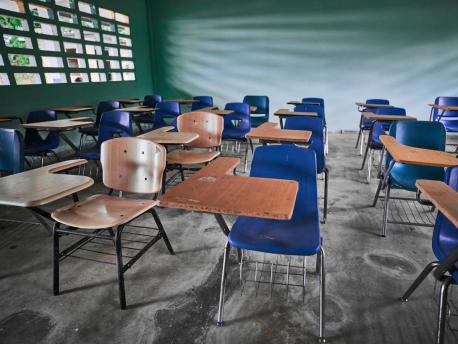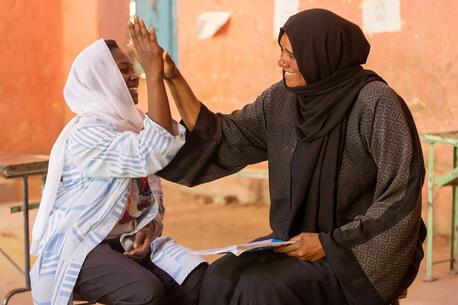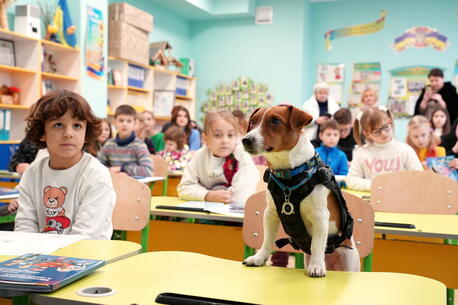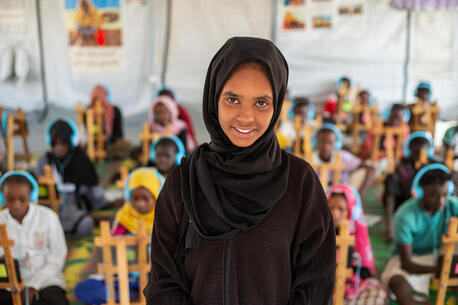
How to Talk to Your Children About School Shootings
Children always look to their parents for a sense of safety and security — even more so in times of crisis. Nine tips to support and comfort your child.
When yet another school shooting makes the headlines, it can cause feelings such as fear, sadness, anger and anxiety wherever you live. Here are some tips from UNICEF on how to approach the conversation with your child and to provide them with support and comfort.
1. Find out what they know and how they feel
Choose a time and place when you can bring it up naturally and your child is more likely to feel comfortable talking freely, such as during a family meal. Try to avoid talking about the topic just before bedtime.
A good starting point is to ask your child what they know and how they are feeling. Kids as young as 5 participate in active shooter drills at school, so some will have complex questions. Others may suffer in silence. With younger children, drawing, stories and other activities can help to open up a discussion.
Check in on what they’re seeing and hearing. It’s an opportunity to reassure them and potentially correct any inaccurate information they might have come across whether online, on TV, at school or from friends.
Use age-appropriate language, watch their reactions and be sensitive to their level of anxiety.
It’s important not to minimize or dismiss their concerns. If you can understand where the worry is coming from, you are more likely to be able to reassure them.
Be sure to acknowledge their feelings and assure them that whatever they are feeling is natural. Show that you’re listening by giving them your full attention and remind them that they can talk to you or another trusted adult whenever they like.
2. Keep it calm and age-appropriate
Children have a right to know what’s going on in the world, but adults also have a responsibility to keep them safe from distress. You know your child best. Use age-appropriate language, watch their reactions and be sensitive to their level of anxiety.
It is normal if you feel sad or worried about what is happening as well. But keep in mind that kids take their emotional cues from adults, so try not to overshare any fears with your child. Speak calmly and be mindful of your body language, such as facial expressions.
As much as you can, reassure your children that there are many people working hard to keep children safe everywhere, including in schools.
Remember that it’s OK to not have the answer to every question. You can say that you need to look it up or use it as an opportunity with older children to find the answers together. Use websites of reputable news organizations. Explain that some information online isn’t accurate and remind them that it's important to find reliable sources.
3. Focus on the helpers
It’s important for children to know that people are helping each other with acts of courage and kindness. Find positive stories, such as the first responders assisting people, advocates working to keep guns out of schools and young people standing up for every child's right to learn and grow in a safe environment.
4. Show children ways they can take action
See if your child would like to participate in taking positive action. Perhaps they could draw a poster or write a poem about safe schools, or maybe you could participate in a local fundraiser or sign a petition. The sense of doing something, no matter how small, can often bring great comfort.
The sense of doing something, no matter how small, can often bring great comfort.
5. Let them know their voice matters
There is no one better suited to speaking up for children's safety than young people themselves. UNICEF UNITE's discussion guide offers suggestions on how to share concerns with local officials and school administrators. Students can ask their school leadership team about safety procedures for school visitors, what measures the school has taken to prevent school shootings, and how students are involved in the creation and implementation of safety plans.
6. Close conversations with care
As you end your conversation, it’s important to make sure that you are not leaving your child in a state of distress. Try to assess their level of anxiety by watching their body language, considering whether they’re using their usual tone of voice and watching their breathing.
Remind them that you care and that you’re there to listen and support whenever they’re feeling worried.
7. Continue to check in
As U.S. school shootings continue to make the news with heartbreaking regularity, remember to check in with your child to see how they’re doing. How are they feeling? Do they have any new questions or things they would like to talk about with you?
If your child seems worried or anxious about what’s happening, keep an eye out for any changes in how they behave or feel, such as stomachaches, headaches, nightmares or difficulty sleeping.
Children have different reactions to adverse events; some signs of distress might not be so obvious. Younger children may become clingier than usual, while teens might show intense grief or anger. Many of these reactions only last for a short time and are normal reactions to stressful events. If these reactions last for a prolonged period of time, your child may need specialist support.
You can help your children reduce stress by doing activities like belly breathing together:
- Take five deep breaths, spending five seconds breathing in and five seconds breathing out, breathing in through your nose and out through your mouth
- Explain that when your child inhales, they are blowing up their tummy softly like a balloon, and when they exhale, the air is going slowly out of the balloon again.
Be ready to talk to your child if they ever bring up the subject. If it’s just before bedtime, finish up with something positive such as reading a favorite story to help them to sleep well.
8. Limit the flood of news
Be mindful of how exposed your children are to the news while it's full of alarming headlines and upsetting images. Consider switching off the news around younger children. With older children, you could use it as an opportunity to discuss how much time they spend consuming news and what news sources they trust. Also consider how you talk about school shootings and gun violence with other adults if your children are within hearing distance.
As much as possible, try to create positive distractions like playing a game or going for a walk together.
9. Take care of yourself
You’ll be able to help your kids better if you’re coping well, too. Children will pick up on your own response to the news, so it helps them to know that you are calm and in control.
If you’re feeling anxious or upset, take time for yourself and reach out to other family, friends and trusted people. Be mindful of how you’re consuming news: Try identifying key times during the day to check in on what is happening rather than constantly being online. As much as you are able, make some time to do things that help you relax and recuperate.


